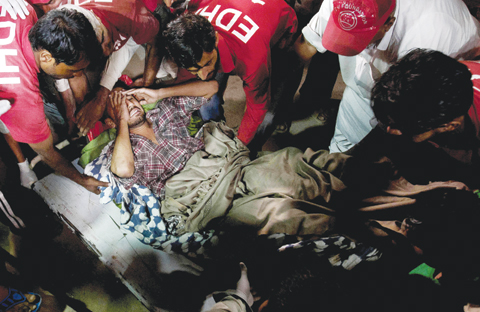 HUB, Pakistan: Rescue workers and volunteers unload an injured victim of a bomb blast at a Sufi shrine from an ambulance upon his arrival at a local hospital in this town near Karachi yesterday. — AP
HUB, Pakistan: Rescue workers and volunteers unload an injured victim of a bomb blast at a Sufi shrine from an ambulance upon his arrival at a local hospital in this town near Karachi yesterday. — APQUETTA, Pakistan: At least 43 people died and scores of others were injured when a bomb exploded at a remote Sufi shrine in southern Pakistan's restive Balochistan province yesterday, officials said. The blast, claimed by militant group Islamic State, hit a crowd of worshippers participating in a ceremony at the shrine of the Sufi saint Shah Noorani in Khuzdar district, some 750 km south of provincial capital Quetta. "At least 43 people have been killed and dozens of others wounded," Sarfraz Bugti told a press conference in the southwestern port town of Gwadar, without providing a precise figure for those injured. Authorities earlier said 25 people had been killed and at least 35 others wounded.
Hakim Lasi, a rescue official with the Edhi Foundation, Pakistan's largest welfare organization, told Geo TV channel the charity had received radio reports that nearly 100 others were wounded, including women and children. Local officials said worshippers were taking part in a devotional dance session, which is held daily before dusk, when the blast occurred. Rescuers were scrambling to reach the shrine, which is located in a remote, mountainous region with limited medical facilities. Authorities have dispatched ambulances and medical workers from Karachi, a three-hour drive from the blast site.
Pakistan Army spokesman Lieutenant General Asim Bajwa said troops and medical teams had been dispatched but that "difficult terrain and long distance" were hampering their progress. Bajwa said that 20 ambulances and 50 soldiers were about to reach the site, while a further 45 ambulances 100 troops were also on their way, along with medical teams. A military helicopter would attempt evacuations at night, he added, but medical teams could not access the area by plane as their were no air strips close by.
President Mamnoon Hussain and Prime Minister Nawaz Sharif strongly condemned the bombing in separate statements. "The government is determined to eliminate terrorism and extremists from the country," Hussain said in a statement expressing sympathy with the victims and their families. A statement from Sharif's office said the prime minister called for the "best medical treatment" to be given to the wounded.
Up to 600 people were at the shrine at the time of the attack, according to local official Tariq Mengal, who told Geo TV that many devotees travelled to the site from Karachi during weekends. The Islamic State claimed responsibility for the attack via Amaq, its affiliated news agency. "35 dead and 95 wounded Shiite visitors in a martyrdom operation attack by the Islamic State fighter that targeted a shrine in a city in Balochistan," the agency said. The bombing follows the killing of Amjad Sabri, a renowned Sufi singer, by two gunmen in Karachi in June. Some observers have said that Sabri may have been assassinated because he was a high-profile Sufi.
Sufism, a mystic Islamic order that believes in living saints, worships through music, and is viewed as heretical by some hardline groups including the Taleban. Balochistan, which borders Iran and Afghanistan, has oil and gas resources but is afflicted by Islamist militancy, sectarian violence between Sunni and Shiite Muslims and a separatist insurgency.
Local militants claimed to have worked with the Islamic State group to attack a police academy in Balochistan last month, killing 61 people in the deadliest assault on a security installation in Pakistan's history. In August, a suicide bombing at a Quetta hospital claimed by the Islamic State group and a faction of the Pakistani Taleban killed 73 people. - AFP










